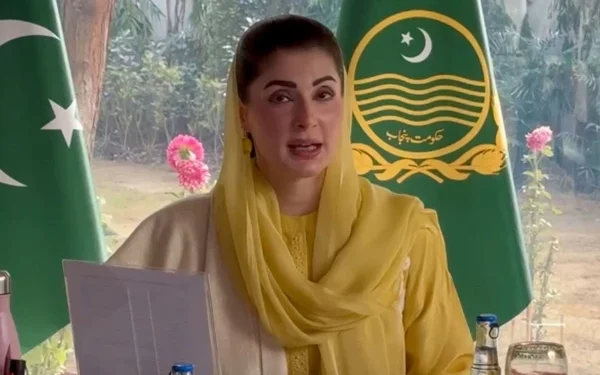Lahore, Pakistan – On the occasion of World Health Day 2025, Punjab Chief Minister Maryam Nawaz Sharif shared a powerful message reaffirming her government’s dedication to revolutionizing the healthcare system in the province. Under the ambitious “Healthy Punjab” initiative, she announced sweeping reforms aimed at improving access to modern medical facilities, enhancing primary healthcare infrastructure, and prioritizing maternal and child health.
A Vision for Public Welfare: “Healthy Punjab”
Maryam Nawaz emphasized that “Healthy Punjab” is more than just a slogan—it is the government’s comprehensive vision and unwavering commitment to transforming the healthcare landscape across Punjab. She described it as a milestone-driven initiative that places public welfare at its core, focusing on accessible, affordable, and quality healthcare services for all.
The Chief Minister noted that healthcare is a fundamental right of every citizen, and her government is determined to ensure that right is protected through tangible policy actions, infrastructure development, and long-term investment in public health systems.
Rapid Progress in Primary Healthcare Services
In her address, Maryam Nawaz Sharif highlighted that within a few months of launching healthcare reforms, a significant number of patients have already started receiving treatment at their doorsteps. This has been made possible through the expansion of health centers and clinics-on-wheels, especially in remote and underserved areas.
She announced that 1,250 existing health centers across Punjab are being upgraded into modern, well-equipped clinics, which will provide a dignified experience to patients. These clinics aim to offer basic health services in a comfortable, hygienic, and efficient environment, reducing the burden on overcrowded hospitals.
Introduction of “Maryam Nawaz Health Clinics”
A key highlight of the healthcare reforms is the introduction of the “Maryam Nawaz Health Clinics”, a new model that surpasses traditional Basic Health Units (BHUs) in terms of technology, cleanliness, availability of staff, and diagnostic equipment.
These clinics are envisioned as the first point of contact for the general public seeking healthcare, offering consultations, lab tests, maternal care, vaccination, and health education under one roof. They are expected to play a pivotal role in preventive care and early diagnosis of common ailments.
Free Medicines and Home Delivery of Essential Drugs
In a historic move, the Punjab government has ensured that major public hospitals are now providing free medicines, diagnostic tests, and outpatient care to all citizens. To further enhance access, a home delivery system of essential medicines is being activated, particularly targeting senior citizens, chronic patients, and those living in remote regions.
This initiative aims to eliminate the hardships people face in acquiring life-saving drugs and is a step towards a more compassionate and efficient healthcare model.
Specialized Care: Cancer, Cardiology, and Transplants
Maryam Nawaz Sharif made a significant announcement regarding the upcoming first government-owned cancer hospital in Pakistan, which is being established in Punjab. This facility is expected to offer world-class cancer diagnosis and treatment to patients from all socioeconomic backgrounds, significantly reducing the cost burden on families.
Additionally, the Sargodha Cardiology Institute is under construction to provide specialized cardiac care services to residents of central Punjab.
The government has also introduced the “Chief Minister’s Children’s Heart Surgery Program”—a lifesaving initiative for infants and children born with congenital heart defects. Moreover, the “Transplant Card” program has been launched to support organ transplant patients, ensuring transparency, affordability, and accessibility.
Emergency Medical Services and Air Ambulances
In an effort to bring emergency medical assistance to the most remote and underserved areas of the province, the Chief Minister launched Punjab’s first air ambulance service. This initiative is particularly valuable for patients in critical condition who require rapid transportation to tertiary care hospitals in metropolitan areas.
The air ambulance service complements ground-based emergency services and is designed to respond to natural disasters, road accidents, and other health emergencies where time is of the essence.
World Health Day 2025 Theme: “Healthy Start, Promising Future”
Referring to this year’s World Health Day theme, “Healthy Start, Promising Future,” Maryam Nawaz stressed that her administration is prioritizing maternal and child health as a cornerstone of its public health policy. She noted that ensuring a healthy start for children sets the foundation for a productive and successful life.
Efforts are being made to improve prenatal and postnatal care, immunization coverage, and nutrition programs. Training programs for midwives and lady health workers have also been expanded to reduce maternal and infant mortality rates.
The Importance of Preventive Health and Public Awareness
In addition to clinical treatment, the Chief Minister highlighted the importance of health education and preventive measures to reduce the overall disease burden. She stated that lifestyle diseases such as diabetes, hypertension, and cardiovascular conditions are on the rise due to poor diet, lack of exercise, and environmental factors.
Maryam Nawaz called upon citizens to adopt healthy habits, including balanced diets, regular physical activity, mental health awareness, and timely medical checkups. Public health campaigns are being launched in schools, workplaces, and local communities to spread awareness and promote preventive care.
Challenges Ahead and Collaborative Governance
While acknowledging the strides made, Maryam Nawaz also pointed out the challenges that lie ahead. These include limited healthcare workforce, rising population pressure, and financial constraints. However, she expressed confidence that with effective public-private partnerships, international cooperation, and community engagement, Punjab will continue to make measurable progress in healthcare.
She also urged the federal government and international organizations such as the WHO, UNICEF, and UNDP to extend technical and financial support to Punjab’s healthcare transformation.
A Healthier Punjab, A Stronger Pakistan
Maryam Nawaz concluded her World Health Day message by reiterating that the wellbeing of people is the government’s topmost priority. She stressed that a healthy population is the backbone of a prosperous, peaceful, and progressive society.
She encouraged citizens to take ownership of their health and support the government’s efforts by making positive lifestyle changes and participating in health initiatives. “Let us work together,” she said, “to create a future where every child is born healthy, every citizen has access to quality care, and no one suffers due to lack of treatment.”

























